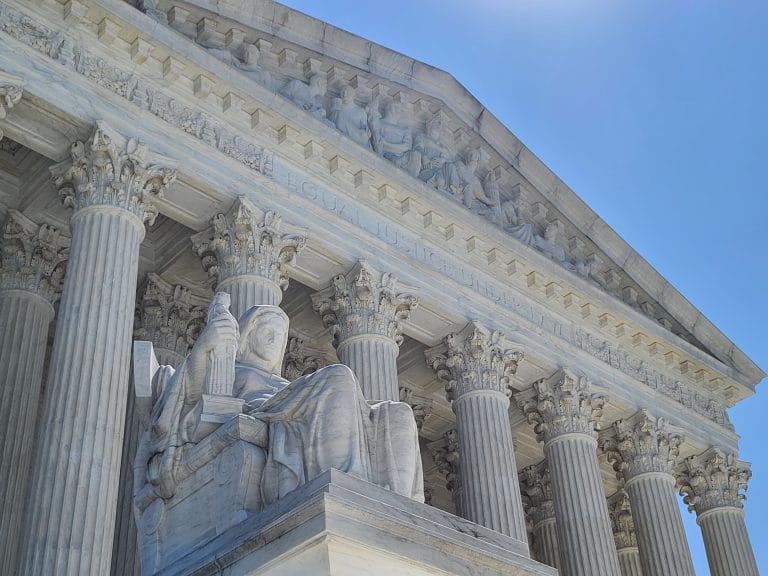When the Supreme Court handed down its Bruen decision, many gun rights advocates eagerly expected a raft of favorable decisions on “assault weapon” bans, the National Firearms Act, or other longstanding gun policy bugaboos to be on the horizon. Instead, it’s increasingly starting to look like the Court will have to address who can and can’t be permanently banned from owning guns.
On Tuesday, a full panel of the Third Circuit Court of Appeals ruled that the federal prohibition on felons owning firearms did not apply to a Pennsylvania man with a nearly 30-year-old conviction for lying on a food stamp application.
“We agree with Range that, despite his false statement conviction, he remains among ‘the people’ protected by the Second Amendment,” Judge Thomas Hardiman wrote for an 11-4 majority in Range v. Attorney General. “And because the Government did not carry its burden of showing that our Nation’s history and tradition of firearm regulation support disarming Range, we will reverse and remand.”
At the time of his offense, Bryan Range pled guilty to a state misdemeanor, was sentenced to three years probation, and paid under $3,000 in fines. Despite never serving a day in jail, Range was barred from owning guns for life under the Gun Control Act, which prohibits anyone convicted of a felony that could be punished with more than a year in prison or a misdemeanor punishable by more than two years in prison from possessing guns. Under Pennsylvania law at the time of his conviction, Range’s crime could have been punished by up to five years in prison, thus preventing him from acquiring firearms legally until this week.
The decision is hugely significant for several reasons. It created the first crack in the question of the constitutionality of the federal gun ban for all non-violent felons. It also created a brand-new circuit split in the process.
Earlier this month, a three-judge panel for the Eighth Circuit came to the opposite conclusion when it ruled against a Minnesota man who challenged his conviction for unlawful possession of a firearm as a felon with past drug convictions. Rather than attempt to delineate non-violent versus violent felonies in determining who is considered a part of “the people” protected by the Second Amendment as the Third Circuit did, the Eighth Circuit panel merely adopted the Supreme Court’s dicta in both Heller and Bruen that suggested felony gun prohibitions were self-evidently lawful.
“Given these assurances by the Supreme Court, and the history that supports them, we conclude that there is no need for felony-by-felony litigation regarding the constitutionality of § 922(g)(1),” Judge Steven Colloton, a George W. Bush appointee, wrote in his opinion.
He also expressed practical concerns over what an attempt to remove non-violent felons from those prohibited from owning firearms by federal law would mean. He posited that it would be akin to invalidating that entire prohibited persons provision from the Gun Control Act.
“According to published data, a rule declaring the statute unconstitutional as applied to all but those who have committed ‘violent’ felonies would substantially invalidate the provision enacted by Congress,” he wrote. “The most recent available annual data show that only 18.2 percent of felony convictions in state courts and 3.7 percent of federal felony convictions were for ‘violent offenses.’”
This discrepancy over how to interpret an important federal criminal statute is practically begging the Supreme Court to get involved. That’s especially true considering it is the Supreme Court’s own actions that have created the discrepancy in the first place. Its new Second Amendment test from last year’s Bruen decision gave rise to these cases and, at least in the case of the Range decision, has prompted outcomes that are in tension with the Court’s own statements that felon disarmament laws are presumptively constitutional. It will likely be forced to step in and clarify how broadly lower courts are supposed to construe the relevant American history of disarming certain individuals.
Given that the Range decision called into question the validity of a federal statute, it’s quite likely that the Department of Justice will appeal, giving the High Court its opportunity to hear the case.
In the meantime, the practical implications of the Range decision could be substantial.
Though the Range ruling only applied to the plaintiff and did not wholly invalidate 922(g)(1), it still sets a precedent for all cases within the Third Circuit–which includes Pennsylvania, New Jersey, and Delaware. That means criminal defendants throughout those three states now have an avenue to contest their convictions or appeal to have their gun rights restored and could do so en masse.
It’s a scenario Third Circuit Judge Cheryl Ann Krause warned her colleagues about in her dissenting opinion.
“Our district courts are left without any intelligible standard, and our citizenry will be left reeling from the consequences: a flood of motions to dismiss indictments, appeals, and reversals of § 922(g)(1) convictions; more armed felons and gun violence on our streets; less faith in elected representatives stymied in their efforts to protect the public; and less trust in a judiciary mired in formalism and the usurpation of legislative function,” she wrote.
She concluded that the only solution is for the High Court to weigh in on the question.
“The sooner the Supreme Court takes up this issue, the safer our republic will be,” she said.
Judge Krause could very well get her wish as soon as the next session. The Supreme Court already decided the question of where the Second Amendment applies in both Heller and Bruen (in the home and in public, respectively). It also dipped its toe in the waters of what is protected by the amendment when it said handgun ownership was protected in Heller.
But now, between the competing circuit decisions now on non-violent felonies, the domestic violence restraining order decision from the Fifth Circuit in Rahimi, and a slew of other cases involving felony indictments and drug users, the Supreme Court is likely going to have its hands full deciding who the Second Amendment protects.






